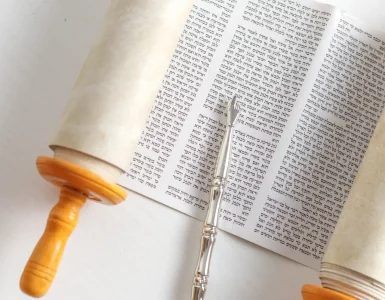The Golden Years – Part III: Putting Down the Knife
“From sixty years and up, for a male, the valuation shall be fifteen shekels, and for a female, ten shekels” (Vayikra 27:7)
Shochtim and Surgeons
In private enterprise, a person may continue working until late in life as long as he feels that he is competent. However, those who are employed to provide services to the public require certain abilities and skillsets, and the assessment of competence cannot be left to an individual to decide himself.
As we discussed last week, age limits have been imposed in fields where an individual’s ability to competently fulfill his responsibilities and duties may be impaired beyond a certain age. We saw that there are two methods of determining age limits, either a uniform age at which employees must retire, or an assessment-based method that determines whether a particular employee is still competent and capable of executing his duties, despite his advanced age.
In the following paragraphs, we will review the deliberations of the Poskim regarding the continued employment of an elderly Shochet. This question is the subject of many Teshuvos of the Gedolei haPoskim. In Jewish communities, the local Shochet was usually appointed by the community and was supervised and certified by the Beis Din or Rav of the town. After many decades of work, questions would naturally arise about a Shochet’s abilities to continue in his position as he reached old age.
Shechita requires a great deal of knowledge and skill, but also the physical strength to perform it correctly. Obviously, the Poskim unanimously hold that a Shochet must not be permitted to continue his work if he isn’t competent, even if he has held the position for a long time. Once he is no longer competent, he is obligated to retire, and if he refuses to relinquish his position voluntarily, he may be dismissed. Should Shochtim be uniformly disqualified based on age or should each case be examined independently?
We have chosen to discuss age limits on Shochtim because the question is similar to that regarding elderly physicians or surgeons. In public healthcare, there is mandatory retirement for medical personnel, but there are some physicians who desire to continue working privately, including performing surgeries. In a general sense, we can infer guidelines from the discussions of the Poskim regarding Shochtim, although they do not discuss medical professionals explicitly.
Essentially, we do not disqualify a Shochet solely due to age, but due to his hands shaking, as stated by the Ba’er Heiteiv (Y.D. 1:32):
The Semag writes: An elderly person and one whose hands shake – whether due to weakness or his nature – the majority of their Shechita is Drisos[1]. Even if they say that they are certain that they did not cause Drisa, they should not be trusted because they are likely to have done so.
The Poskim deduce from this ruling that an elderly Shochet is only disqualified if his hands shake. However, the Semag’s wording gives the opposite impression. He writes, “An elderly person and one whose hands shake”, which implies that there are two sorts of people who are disqualified. An elderly person (a “Zaken”, which usually refers to a person over the age of 70) is disqualified regardless of his competence, and “one whose hands shake” is also disqualified. If this was not the Semag’s intention, he should only have mentioned a person whose hands shake.
However, there is a fascinating dispute in this regard, which impacts the discussion. The source of the Ba’er Heiteiv’s ruling is the Sefer Lechem haPanim (1:35) which states, “And I found in the Semag in the name of Moreinu haRav Isaac Stein and the Mordechai, an elderly person and one whose hands shake…” However, the Noda b’Yehuda (Tinyana Y.D. 1) fiercely attacks the Lechem haPanim because this statement does not appear anywhere in the Semag. The Yad Ephraim (ibid. 10) defends the Lechem haPanim, arguing that he refers to the Gilyon Semag which states, “And I found in the name of Morenu haRav Isaac Stein and the Mordechai haZaken”.
According to this reading, the Semag does not refer to an elderly person at all – he is citing the Mordechai Zaken (otherwise known as the Mordechai haYashan – an earlier version of the Mordechai). If so, the only condition for a Shochet to remain in his position is that his hands must not shake, as the aforementioned Poskim concluded. Age is of no relevance.
May one rely upon a Shochet who claims that he knows when his hands usually shake[2] and he will refrain from Shechita at that time? This is the subject of some debate among the Poskim.
The Poskim also discuss whether we can rely upon a Shochet whose hands sometimes shake who has already performed a Shechita and claims that his hands did not shake at the time. Though the majority of the Poskim rule that he should not be permitted to perform Shechita in Lechatchila, perhaps he should be believed Bedieved if he is known to be an expert Shochet.
There are, moreover, many cases discussed by the Poskim, which depict how difficult it is to determine whether an elderly Shochet is still competent. For example, the Devar Moshe (Tinyana 85) discusses a case of an elderly Shochet who was summoned for an examination as to whether he was still capable of checking his Shechita knives. During the examination, his hands shook but he claimed that it was due to feeling under pressure, and during his regular work they did not shake. The Devar Moshe ruled that they could accept his claim, however, the Beis Shlomo (Y.D. 10) disagreed.
Nevertheless, the Beis Shlomo did concede that if we only witness his hands shaking during other activities which bear no comparison to Shechita, we would not disqualify him. For a more extensive discussion of this topic see the Darchei Teshuva (Y.D. 1:55).
The Poskim clearly imply that one cannot necessarily accept the claims of a Shochet regarding his competence, or his estimation of his own abilities. Though he may be an expert Shochet with a Chazaka that his Shechita is Kosher, and certainly not suspected of willingly feeding others Treif, it is psychologically difficult for him to accurately assess his own state. After decades of experience during which he considered himself an expert, knowledgeable Shochet, he will not necessarily realize when his capabilities have declined and voluntarily vacate his position. This is clearly stated by the Beis Ephraim (Kuntres Yafeh l’Bedika, cited by the Darchei Teshuva ibid. 173):
It is difficult to rely on the Shochet himself. Though he claims that he does not feel that his strength has waned and his strength is the same now as it always was, we cannot rely on his words. For it is possible that a Shochet doesn’t realize and is making an assumption. When people grow old their senses are affected – such as a weakening of the hands – and they do not realize it.
Until this point we have discussed a Shochet who is known to have shaking hands. Is there any basis to disqualify a Shochet purely based on his age? There is a fascinating Mordechai in this regard (beginning of Chulin):
Rabbenu Baruch writes: I saw stated in Hilchos Shechita that R’ Eldad ben Machli who descended from the Aseres haShevatim related that Yehoshua said in the name of Moshe in the name of Hashem: “Anybody who sacrifices for Hashem but he does not know the Halachos of Shechita, one may not eat from his Shechita… and a Shechita is invalid if it is performed by a woman, castrated man, elderly person over the age of 80, and a youth younger than 18.” But all of these are stringencies – the custom is otherwise.
The Ba’er Heiteiv (ibid. 27) cites this Halacha in the name of the Beis Ya’akov (25) but he concludes: “It depends on the person – if his physical strength has waned he should not perform Shechita even if he [has only reached] the age of 50.” He also cites the Tevuas Shor (ibid. 64) who maintains that as people over the generations have become steadily weaker, Shochtim should be carefully examined even before they reach the age of 80. The Ksav Sofer (Y.D. 3) similarly rules that set age limits should not be imposed – each case should be evaluated independently.
The Teshuva me’Ahava (1:118) responded to a Rav of a community who wanted to disqualify the local Shochet because he had reached the age of 80. He told him that since Chazal only disqualified a Kohen once his hands begin to shake (as discussed in last week’s essay) and did not set an age limit, there is no need to be concerned about the aforementioned stringency of the Mordechai, particularly given the fact that the Mordechai himself notes that “the custom is otherwise”. He writes:
In general – it depends on the person – if he has strength and feels fit, even if he is 100 years old, all of the animals that he slaughters are Kosher. If he does not feel fit –even if he is only 30 years old his Shechita is invalid.
[The Chazon Nachum (53) discusses whether an elderly Shochet can claim that he has a “Chazaka” on his position. If he claims that he is still competent and that the community does not have the right to dismiss him, though Halachically he should stand down, if he refuses to do so the community can pay his wages and force him to stop performing Shechita.]The Pischei Teshuva (1:12) cites the Meir Nesivim (76):
Today, in these generations where people are weaker, it is appropriate and correct for anybody who is able to institute a rule that at least from the age of 70 a person should not perform Shechita – even if he feels fit to do so – so as to make a uniform standard. Even before the age of 70 he needs to be carefully examined. The Rabbanim are obligated to ensure that the Shochtim should occasionally come to them to be tested for they quickly deteriorate – they themselves do not realize that their hands are shaking.
Many Poskim cite the Meir Nesivim – some hold that we should take his position into consideration but others disagree, arguing that a Shochet who feels strong has the right to continue in his position (see the Darchei Teshuva ibid.).
Several principles emerge from all of the above. The basic premise of this Halacha is that in order to determine whether somebody is capable of continuing to work in public service, we cannot rely on his own appraisal. This is true of Shechita but presumably also of surgery and other medical procedures, which are matters of Pikuach Nefesh. He must be examined by others to see if he is still competent.
We also see that
since this is a somewhat vague issue that is difficult to define, many Poskim
over the generations saw a need to set an age limit for those working in
sensitive fields and did not permit individuals to make their own decisions in
this regard.
[1] A valid Shechita slices an animal’s Simanim (trachea and esophagus). Drisa is when the Shochet cuts through the Simanim using pressure from the knife, rather than a slicing motion.
[2] It is common for tremors to be absent in the morning and appear only later in the day as one tires.












